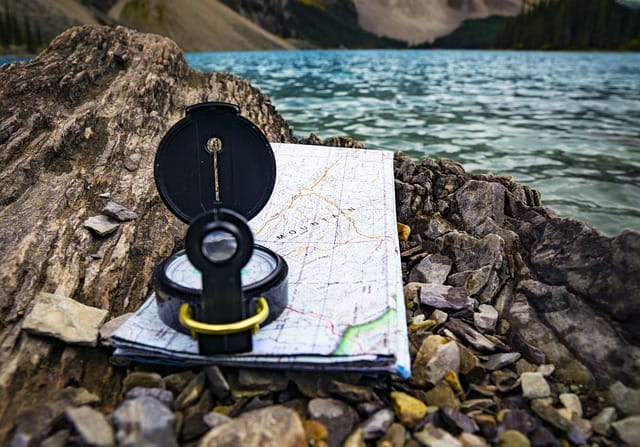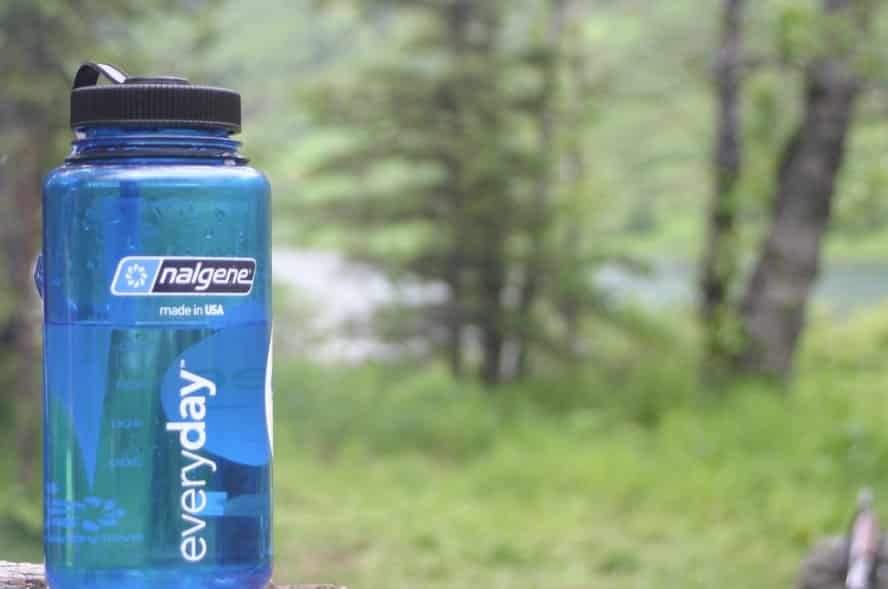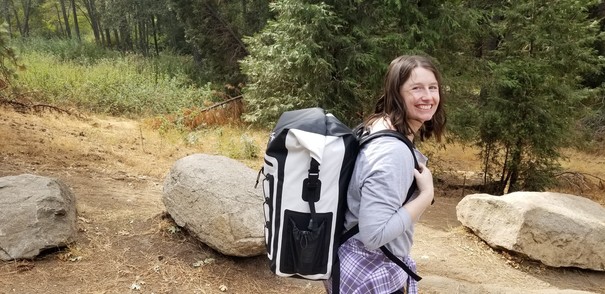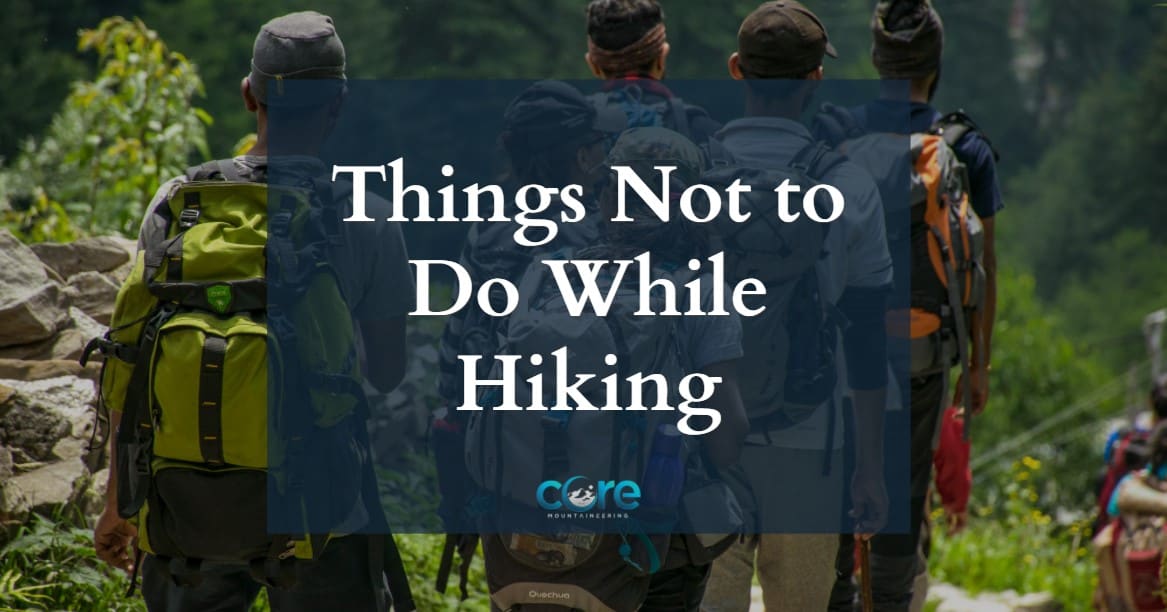There are many articles out there to help you prepare for a hike, such as our article, How to Prepare for a Hike the Night Before, but what about the articles that tell you what you should not do while hiking.
There are many hiking “don’ts” that can cause harm, and even death, if you don’t know what they are. It is good to be prepared and know what mistakes to avoid while you are hiking.
Here are top things to not do while hiking.
Not Do Your Research
The first thing you should not do while hiking is to not do your research. While this is primarily a preparation step, you do not want to be that guy or girl who doesn’t know what they are doing while hiking on the trail.

For example, while I was hiking at Chasm Lake in Rocky Mountain National Park, I passed a guy at 10AM who was planning to do Longs Peak and asked where the trail was.
If you have read our article on “What to Bring When Hiking a 14er” you will know that 10AM is too late to start a 14er.
Not doing research on the hike you are doing will set you up for failure.
You might struggle with trail navigation and or run into possible inclement weather you didn’t prepare for.
How You Should Do Your Research Before Hiking
Prior to going hiking, make sure to review trail maps and descriptions so you know the route you need to take. Checking trail conditions and updates can prepare you for current trail conditions so you bring the proper gear.
Use a checklist to make sure you bring everything. We have a checklist at the bottom of our ebook you can print out.
Finally, keeping up-to-date on the latest weather conditions will help you prepare for adverse weather conditions and determine the start time and date you go hiking.
Wear the Wrong Clothing and Footwear
Whether you are going on a short 2-mile hike or an all-day adventure, wearing the right kind of clothes and for the trail can make or break your hiking experience.
Materials such as denim and cotton should be avoided because they dry slowly when they get wet.
This can be uncomfortable, if not dangerous, in colder temperatures.
Additionally, wearing the wrong kind of footwear for your hike, such as flip flops, can set you up for injury.
What Hiking Clothing Should You Be Looking At
Make sure to wear quick-dry clothing made from materials like polyester, nylon, or merino wool. Be sure to pack insulating layers and waterproof gear as well so you can stay warm and dry while hiking.
As for footwear, you will want to wear a supportive shoe such as a trail runner or hiking boot.
Not Bring Enough Water

Not bringing enough water can set you up for dehydration, increasing your chances of heat-related illnesses and altitude sickness. This can quickly bring your hiking trip to an end!
How to Stay Hydrated While on the Trail
Make sure to drink plenty of water a few hours before your hike to prevent dehydration. The American Hiking Society recommends drinking a quart of water for every hour of intense exercise.
Sometimes, just staying hydrated is not enough.
If you lose too much salt from excessive sweating, your body will not be able to regulate liquids.
This is known as hyponatremia. It is recommended to bring along salty snacks and sports drinks filled with electrolytes to replace lost salt, especially on hot and humid days.
Drinking Alcohol While Hiking
Just like the night before a hike, alcohol should be avoided while on the trail. Alcohol affects everyone differently, but it slows your body and your mind down.
You’ll be more likely to fall over on rough terrain, but it will also affect your hydration.
What You Should Be Doing
Just like hydration above your main source of fluids should be clean water. Save the parting for when you get back home!
Bring The Wrong Snacks
Not properly fueling while you are hiking can leave your energy levels low and your morale even lower. Some common mistakes beginner hikers make when packing snacks include:
- Bringing too little
- Not enough variety
- Not enough savory snacks
- Not enough nutrition
- Too much sugar
What Snacks Should You Bring
Make sure to bring enough food, so you stay energized on the trail. Bring a variety of snacks that range from salty to sweet that pack a good nutritional value.

It’s okay to bring those sugar-filled victory snacks, like Swiss Cake Rolls, but keep those at a minimum because they are just empty calories that will end with a sugar crash.
Some of my favorite, nutrient-dense snacks include beef jerky, GoGo squeeZ Applesauce, trail mix, fresh fruit, and Nutella.
Not Knowing Your Hiking Gear
Pulling your new GPS device out of its package when leaving your car, right before getting on the trail. This goes the same for a hiking backpack or tents you’re using for the first time. Nobody wants to figure out how to set up a tent for the first time while it’s raining.
What You Should Do With Your Hiking Gear
You have a new piece of gear you’re eager to get on the trail with you. That’s great, but you should really know the ends and out of your equipment before heading out. If you have a new tent or backpack, check to make sure everything that should’ve been included in there.
Also, set your tent up in the yard or inside the living room, in case there is a bit of a learning curve with an unusual setup.
Not Be Considerate
Out of all the Leave No Trace principles, nothing annoys me more than when hikers are not considerate of others. Listening to music out loud on their Bluetooth speakers or phones, uncontrolled pets, and disturbed surroundings can ruin a hike’s purpose: enjoying the peaceful solitude of nature.
What You Should Do
Follow the 7th Leave No Trace Principle, and be considerate of other visitors. Keep that Bluetooth speaker at home, make sure you keep your dog on a leash, and as always, leave your surroundings as you found them so others can enjoy them too.
Here is our article if it’s OK to play music while hiking.
Not Follow Trail Etiquette
Trail etiquette is often ignored but should not be while hiking. Some common trail etiquette guidelines that are often broken include: not giving uphill hikers the right-of-way, slowing down other hikers, and group-specific trail etiquette.

Here is why you should not break trail etiquette while hiking:
- Uphill hikers have right-of-way because they have a shorter field of vision than downhill hikers, and they also may not want to break their hiking pace as they trek uphill. While they may welcome a break, that is their choice to make.
- Slowing down other hikers is another thing you should not do while hiking. Nothing is worse than being less than half a mile from the trailhead after a 10+ mile hike and getting stuck behind a leisurely tourist family that doesn’t know they should move over.
- When it comes to larger hiking groups, trail etiquette is important. Larger groups can take up the trail if they are not aware are their spatial boundaries. Additionally, single hikers often don’t know what to do when passing a larger group.
How to Follow Trail Etiquette
Give the uphill hiker the right-of-way. If you are hiking slower than the people behind you, be courteous and move over.
If you are part of a large hiking group, make sure to hike single-file, so you are not taking up the whole trail. Finally, if you are a single hiker coming upon a large group, it’s better if you step off to the side to let them by.
Go Off The Trail
Going off-trail can result in several implications, which is why it should not be done while hiking. Not only could you get lost or hurt, but you can damage the environment by increasing erosion off-trail.
You can create a “social” trail that other hikers could follow by mistake.
What You Should Do While Hiking
Stay on the defined trail, especially if you are a beginner or novice hiker. It may be tempting to, “take a quick shortcut” crossing a switchback, but then the defined path slowly gets ruined.
Complain
Hiking can be strenuous, exhausting, and sometimes frustrating, which can cause a dip in attitude. It can be hard not to complain, but complaining should be avoided while hiking to keep the group’s morale, or just yourself, high.
Sometimes certain things just suck. If it’s too hot for you, everyone else your hiking with knows it hot already without some complaining about it.
What You Should Do
Turn your negative thoughts into positive statements. Positive self-talk and encouragement can go a long way in boosting your morale and can help push you to reach the beautiful destination you sought to achieve.
Eat Wild Fruit
This is just a bad idea. Eating something that looks edible, but you’re not sure what it is can make you really sick, or worse!
No matter how tasty those little red berries look, just avoid them.
What You Should Do
If you’ve done your planning correctly, you should have brought all the food you need on a hike and camping trip. There’s really no good reason to eat something out in the wild unless you’re completely sure you know what it is, and you won’t get sick from it.

If you’re looking for some backpacking meal recipes check out Colorado Sundays, they have a variety of backpacking meals you can make yourself.
Leave a Trace
The damage we do when littering can permanently damage the trails and the environment. When you leave a trace, you are doing one or more of the following:
- Damaging trails and natural areas
- Polluting water
- Putting wildlife at risk
- Increasing the risk of wildfires
- Contributing to overcrowding of parks
How to Leave No Trace
As the saying goes, “Take only memories, leave only footprints.” Be a responsible hiker and follow the Seven Leave No Trace Principles.
Hike Alone
If you have ever seen or read 127 Hours, then you know that hiking alone is something that you should not do while hiking. Hiking alone is dangerous and can increase your risk on the trail because other hikers might not be able to summon help if anything were to happen.
What You Should Do
Bring a friend, or at the very least, tell someone where you are going and what time you expect to be back. If something goes wrong on the trail, you will have a fellow hiker to get help if an emergency arises.
I’m not saying hiking solo is the worse thing; if done correctly, when you feel comfortable being alone can be a wonderful experience, but you shouldn’t solo hike your first time out.
If you’d like to start hiking alone we have a great guide on how to do it safely, Women’s Solo Hiking Guide – Feel More Confident When Hiking Alone







